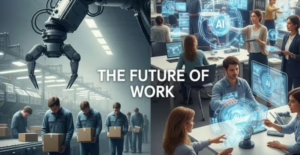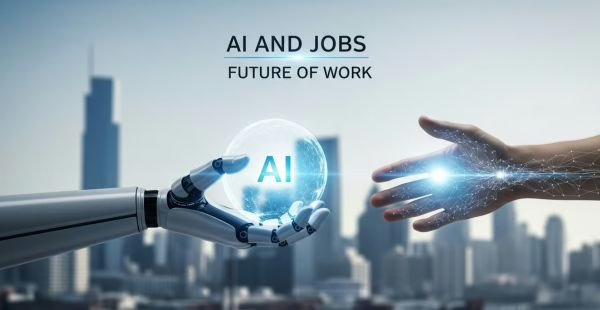
Artificial Intelligence (AI) is no longer a futuristic concept—it is here, reshaping industries, workforces, and economies across the globe. From chatbots handling customer queries to advanced machine learning algorithms diagnosing diseases, AI is transforming how work gets done. This rapid progress naturally raises a pressing question: Will AI replace jobs or create new opportunities?
The answer is not a simple yes or no. While certain roles are at risk of automation, AI is also paving the way for new job categories, specialized skills, and emerging career paths that didn’t exist a decade ago. Let’s explore both sides of this important debate.
Will AI Replace Jobs?
Many studies suggest that AI has the potential to automate routine and repetitive tasks. Roles in industries such as manufacturing, data entry, retail operations, and even parts of accounting may be vulnerable. This trend is often described as AI taking over jobs, particularly those that rely on predictable workflows.
For example, warehouse robots can now pick and pack products more efficiently than humans, and AI-powered customer service systems can resolve common issues without human intervention. While this may reduce the demand for some traditional roles, it also shifts human workers toward more strategic, creative, and supervisory responsibilities.
Jobs That AI Cannot Fully Replace
Despite its capabilities, AI has clear limitations. Jobs requiring emotional intelligence, ethical decision-making, empathy, and complex human interaction are far less likely to be automated. Teachers, healthcare professionals, leaders, and creative artists fall into this category. These AI-proof jobs will continue to be vital in an AI-driven world, though the nature of these professions may evolve with technology.
Emerging Career Paths in the AI Era
While some jobs may diminish, AI is simultaneously creating brand-new opportunities. Companies worldwide are hiring for roles such as AI engineer jobs, where specialists design and maintain AI systems. These positions require a strong foundation in programming, data science, and machine learning.
Another fast-growing area is Generative AI jobs, which focus on building systems capable of creating text, images, video, and even music. These jobs are in high demand as industries explore generative AI for content creation, product design, marketing, and entertainment.
Similarly, AI prompt engineer jobs have recently gained attention. Prompt engineers specialize in crafting precise instructions for AI systems, ensuring they generate accurate, useful, and ethical outputs. This role blends creativity, technical knowledge, and problem-solving—making it highly sought after in companies experimenting with large language models.
With remote work becoming more common, AI remote jobs are also on the rise. Professionals in AI development, data labeling, research, and even AI-driven design roles are finding opportunities to work from anywhere in the world. This flexibility expands access to global talent markets and empowers workers to balance career growth with lifestyle choices.
The Future: Transformation, Not Elimination
Rather than framing the debate as a battle of humans versus machines, it may be more accurate to view AI as a transformative force. AI is unlikely to completely eliminate the need for human work. Instead, it will reshape the skills and roles in demand, requiring continuous adaptation.
Governments, educational institutions, and businesses have a responsibility to prepare the workforce for this shift through reskilling, upskilling, and training programs. Workers who embrace lifelong learning and develop hybrid skill sets—blending human strengths with AI capabilities—are likely to thrive in the years ahead.
Conclusion
The question of Will AI replace jobs or create new opportunities? does not have a definitive answer, but the evidence suggests that AI will do both. Some roles will decline, but others will emerge stronger than ever. The key lies in how individuals, companies, and societies respond to the challenges and opportunities of the AI era.
Instead of fearing AI taking over jobs, we can prepare to adapt, reskill, and seize the potential that AI offers—from AI engineer jobs to Generative AI jobs, AI prompt engineer jobs, and even flexible AI remote jobs. The future of work may look different, but it is far from disappearing.
Disclaimer
This blog is intended for informational purposes only. The insights provided are based on current trends and research at the time of writing. AI technologies and their impact on employment are evolving rapidly, and outcomes may vary depending on industry, geography, and policy decisions. Readers are encouraged to seek additional resources and expert guidance when making career or business decisions related to AI.

